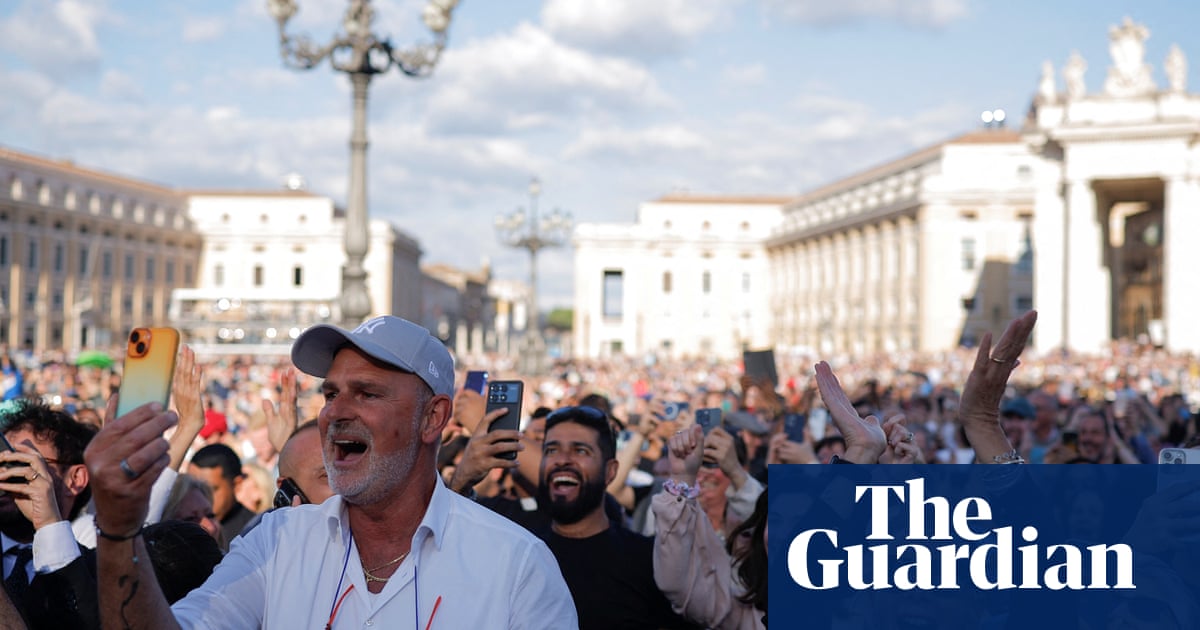Noah from Los Angeles had listened carefully to the first words spoken byPope Leo XIVfrom the balcony of St Peter’s Basilica, but his lack of Italian meant he understood none of it.
“Wait, you mean he’s American? Really? Wow, that’s exciting,” he said with some surprise on his way out of St Peter’s Square. As he absorbed the news of the first American pope, he said he hoped it would be good news for his country. “We sure as hell need it,” he said.
Others said they knew little about Robert Prevost’s views or how his papacy might unfold. The new pope featured on few lists ofpapabile– cardinals considered to be in the running for the top job. His name was not among the favourites circulated by bookmakers William Hill six hours before the white smoke appeared above the Sistine Chapel.
Maria from Ireland, possibly unaware of the new pope’s apparently liberal leanings, said she was disappointed and worried. “I fear this is the result of lobbying by hard-right American Catholics. It’s not what I was hoping for.”
But Leo, another visitor from Ireland, said his papal namesake “looks impressive”. He added: “I think an American pope will help, especially the way things are in the world now.”
When white smoke billowed out of the conclave chimney on the roof of the Sistine Chapel shortly after 6pm on Thursday signifying the 133 cardinal electors had chosen a new leader for the 1.4 billion members of the Catholic church, it was greeted by cheers, whoops, whistles and clapping from the thousands who had gathered in the square. At that point, no one knew who the new pope was, but it did not stop the chant of “viva papa” echoing around St Peter’s Square. Some people literally jumped with joy.
The Catholic faithful and the curious tourists who had been waiting for most of the day began rushing towards the basilica, from where the pope would speak his first words within the hour. Nuns in habits and priests in cassocks moved with unexpected agility. Most had broad smiles, but some wept or held their palms together in prayer.
Everyone wanted to be near the front for the pope’s first blessing. Phones were held aloft to capture the moment: white smoke against a perfect blue sky.
Roads leading to St Peter’s Square began to fill with people who had heard the news on their phones, on the radio or on TV. There was a rush to reach the basilica in time for the pope’s first appearance.
A lucky few got close enough to witness the colourful display of pageantry from Vatican bands and Swiss guards, resplendent in colourful uniforms; others crowded around the big screens.
Way beyond the reach of the ecstatic crowds, Prevost was taken to the Room of Tears, adjacent to the Sistine Chapel, to choose his name, dress in his papal cassock and no doubt say his prayers.
When he finally stepped on to the balcony to roars from the thousands packed into the square, he looked a little shellshocked at first, but soon his tentative smiles became broader.
Unlike Francis, who spurned much of the trappings of the papacy from the day he was elected in 2013, Prevost wore a traditional red papal garment over his white cassock.
A crowd of clergy and staff members at Chicago’s Catholic Theological Union erupted in a joyful cheer as Pope Leo walked on to the Vatican balcony, four decades after he graduated from the South Side school.
Ashley and Chris Black, Catholics from Dallas, Texas, were in tears. They had come to Rome on holiday and had made their way to the square thinking “it would be amazing if we were here to witness a new pope being chosen”, said Ashley.
“It has overcome me to be honest,” she added. “This is a once in a lifetime experience.”
Lucas and Isadora had travelled from Brazil for a holiday, planned a year ago. “We had no idea we’d be here for the new pope,” said Lucas. “I am very happy.”
Many were relieved that the decision had come quickly, on the fourth ballot of the cardinal electors, and less than 26 hours after the conclave began. A long conclave might have suggested that cardinals were unable to agree on the church’s future direction.
Among the pressing matters facing the pope will be the wars in Ukraine, Gaza and South Sudan. Francis Pakduer, who comes from South Sudan, said he hoped the new pope would be a man of peace. “That is what I pray for more than anything,” he said.
